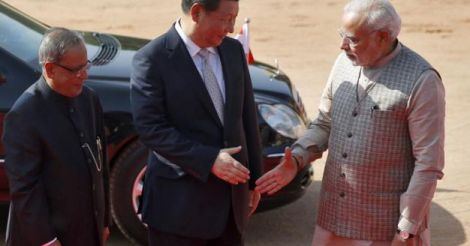China has been much in the news recently, with its blocking of India’s NSG membership bid , support to Pakistan over Kashmir ,defiance of world opinion over the South China Sea, and a “transgression” (not“incursion”) across our border in Uttarakhand.
All this a month before our PM’s visit to China for the G-20 Summit, and two months before the BRICS Summit brings President Xi Jinping to Goa!
The border story brought back memories of the three-week standoff in Depsang in April- May 2013, which almost put at risk the Chinese Premier's visit to India, and our larger relationship.
As Foreign Secretary at the time I faced three weeks of tense negotiations , till the Chinese withdrew a real incursion some 19 km across the Line of Actual Control, and in the face of a clear, coordinated message from our side, restored the status quo.
A similar incursion took place in 2014 , when President Xi was visiting India. Such incidents are unlikely to end. The recurring tensions at the border flow from increasing assertiveness in Chinese foreign policy, with the armed forces occasionally acting on their own script. The difficulties faced by South East Asian countries over the South China Sea (SCS) have similar origins.
The rebuff to our NSG membership, even after PM raised the issue with President Xi ,and its casual dismissal of our objections to the China-Pakistan Economic Corridor (CPEC) –running through POK , demonstrate that China is not willing to deal with us on terms of equality, in Asia or in the global arena.
After all China has not claimed that India’s membership of NSG would affect Chinese national interest adversely. It argued in favour of the Non-Proliferation Treaty criterion (knowing that we opposed the unequal NPT from the time it was negotiated in 1966-67!
Also read: Dealing with China
And that France was one of the founders of the NSG in 1975 without having signed the NPT. China joined the NPT only in 1992, and was admitted to the NSG in 2004) and in favour of Pakistan.
The policy towards China will clearly be one of our greatest challenges in the decade ahead. It stands at the axis of two of foreign policy’s highest priorities: dealing with neighbours ,and with the great centres of global power.
The Rise of China has caused a tectonic shift in the politics of the world after 1990.
For India, it has a particular salience since China’s astonishing economic growth has been accompanied by greater military power and reach. Hence we, and other neighbours of China as well as the US and other great powers , are all carefully assessing China’s strategic goals and motivations.
Has the policy of “Peaceful Rise of China “with emphasis on economic and soft power, been replaced by a’ Middle Kingdom assertiveness ?
A change does seem evident in the SCS where China’s strident claim based on a supposedly historical “ Nine –dash –line “ reaches close to the shores of other littorals, and if accepted , would convert the SCS virtually into a Chinese sea! While there have recently been some vague statements from Beijing suggesting some room for negotiations, so far China’s attitude seems to reflect the belief that its smaller neighbours have no choice but to accommodate a strong China on its terms.
Foreign Minister Yang Jiechi once told the Singapore Minister that “ China is a big country, and the others are small countries, and thats just a fact”!
The same Yang Jiechi is now State Counsellor , and the counterpart of our NSA Mr. Doval ,as Special Representative for boundary negotiations. As in the SCS, China has “historical” border lines, arbitrarily claiming Arunachal Pradesh as “South Tibet”, and it has not agreed to demarcate even the Line of Actual Control in Ladakh.
Negotiating an acceptable boundary agreement will be a long, painstaking exercise in patience. How India develops its attributes of power, and relations with the US , Japan and Russia ( and Pakistan ) will be critical to the outcome.
(To be concluded)

























